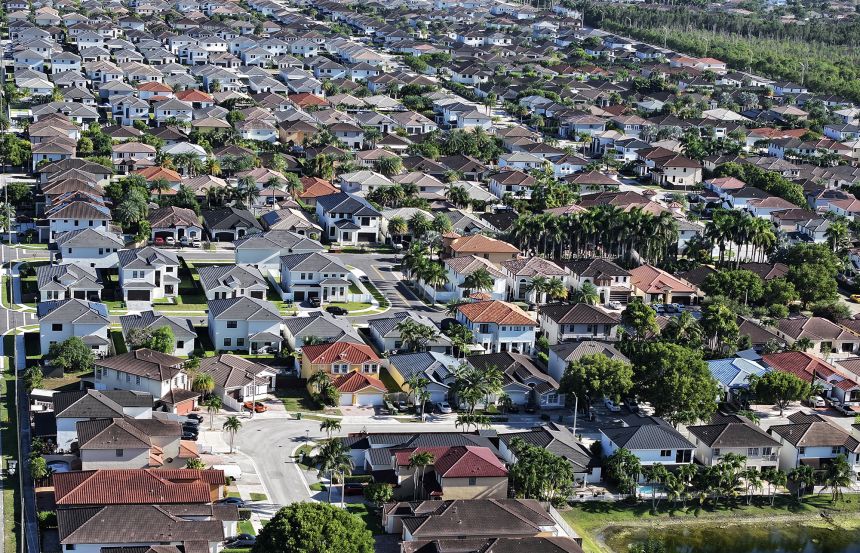For the past few years, Brock and Lori Harris, a husband-and-wife real estate agent team in Los Angeles, have navigated a red-hot housing market. Lately, they say that’s begun to change.
Homes that would have once been flooded with buyer interest are languishing on the market, Lori Harris said.
“In years past, we would have packed open houses and then get 15 offers. Now, we sometimes still have packed opens but only get one offer,” she added.
LA isn’t the only city where the housing market is losing steam. In the years following the pandemic, a fever gripped the housing market: Sellers juggled multiple offers and scarce listings were often bid far above asking.
Now, that fever looks to be breaking.
More homes have come on the market this year, but buyers aren’t biting the way they used to. Tired of high mortgage rates, surging insurance costs and stubbornly expensive listings, many are sitting on the sidelines. The ones who are interested are taking their time and searching for a good deal, real estate agents told CNN. That shift has weakened sellers’ grip on the housing market and given buyers new leverage.
“It feels like buyers are the most cautious they’ve been since the beginning of Covid,” said Brock Harris.
There are some signs that the lack of enthusiasm from buyers across the country is translating into softening sales prices.
More than one in four home sellers on Zillow cut their asking price in June, according to the real estate search engine. That’s the highest share on record for June since at least 2018, Zillow said.
The pullback in demand is hitting newly constructed homes, as well. A Monday report from the National Association of Home Builders said that 66% of housing construction firms employed sales incentives to attract buyers, the highest percentage in the post-Covid period.
As is always the case with real estate, location matters. More than 30% of the nation’s largest markets have seen prices dip by at least 1% from recent highs, according to an August report by Intercontinental Exchange (ICE).
Few places illustrate the housing market’s reversal as starkly as Florida.
South Florida’s housing market took off after the pandemic, fueled by remote workers drawn to sunshine and relaxed Covid restrictions. But over the past two years, the state’s housing market has significantly stalled – a harbinger of what is now happening in other areas of the country.
“Overall, I would call this a buyer’s market,” Sharon Ross, a real estate agent based in Delray Beach, Florida, said of her area. “We’ve got heavy inventory.”
Price declines in Florida continue to lead all states, ICE found, with 85% of counties in the state showing annual price declines.
Along with Florida, Texas has also seen steep price cuts this year, the report found. Parts of California, Arizona, Colorado and Idaho have seen home prices decline by more than 3% from recent highs, according to the report.

The slowdown isn’t affecting all areas equally, though. Some areas in the Northeast and Midwest are still seeing prices rise, but at a slower pace than in years past, ICE found.
Ross said many of the buyers she works with are no longer willing to pay the prices they might have a few years ago, now that home insurance rates and property taxes have climbed so much higher.
Some sellers in the area have been shocked by lackluster interest in their homes.
“I’ve had three single-family houses that all canceled their listings because they could not get the price they wanted,” Ross said. “The challenge is managing their expectations.”
Elevated home prices and stubborn mortgage rates only tell part of the story of the slowdown, said Daryl Fairweather, chief economist at Redfin.
“I think it’s not just a story about mortgage rates and affordability,” Fairweather said. “There is some hesitancy to make a big financial commitment when there is so much economic uncertainty going on.”
President Donald Trump’s trade and tariff policies have chipped away at economic growth, while a weaker-than-expected jobs report last month has deepened concerns that the slowdown may be sharper than anticipated.
“If you lose your job, it can be really scary that you might not be able to find another job that would allow you to keep paying your mortgage,” Fairweather said. “That may be weighing on the minds of buyers.”
Another factor that may be keeping some renters from making the leap into homeownership: The rental market has steadied.
Until recently, median rents across the United States had been slipping, easing the pressure on tenants to buy.
“If you’re looking at a one-bedroom condo versus a one-bedroom apartment, it’s going to be pretty obvious that the monthly payment is going to be a lot lower for the one-bedroom apartment in most places,” Fairweather said.
However, recently, that trend began reversing. The median asking rent rose 1.7% year-over-year in July, the largest jump since January 2023, according to Redfin.
Sandy McAlpine, a real estate agent who works in Charlotte, North Carolina, said she’s heard that many would-be buyers are holding back for now, in the hope that the Federal Reserve will soon cut interest rates, making borrowing for a home more affordable.
“Everyone thinks that the Fed rate cut is when they need to buy,” McAlpine said.

While mortgage rates have been falling in anticipation of an expected rate cut in September, there’s no guarantee it will come — and, when the Fed started to cut its interest rates last fall, mortgage rates actually rose.
While the Fed doesn’t directly set mortgage rates, its actions can affect the 10-year Treasury yield, the key benchmark that influences home borrowing costs.
Last week, the 30-year fixed mortgage rate averaged 6.58%, the lowest level in 10 months, according to Freddie Mac.
Fairweather noted that Redfin expects mortgage rates to keep easing next year but cautioned that nothing is certain given the shaky economy. For buyers waiting for the right moment, she said, today’s softer competition could offer a rare opening.
“There is this kind of window that buyers didn’t have before, where they are able to negotiate better prices and mortgage rates aren’t as high as they were earlier in the year,” she said. “For buyers who have been on the sidelines, now might be a good time to take a second look.”
